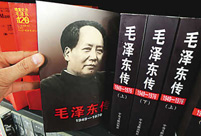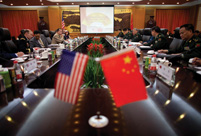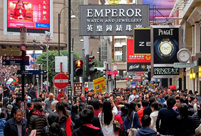 'Jin' named the word of the year by cross-strait netizens
'Jin' named the word of the year by cross-strait netizens Chinese scientific expedition goes to build new Antarctica station
Chinese scientific expedition goes to build new Antarctica station
 Chinese naval escort fleet conducts replenishment in Indian Ocean
Chinese naval escort fleet conducts replenishment in Indian Ocean 17th joint patrol of Mekong River to start
17th joint patrol of Mekong River to start China's moon rover, lander photograph each other
China's moon rover, lander photograph each other Teaming up against polluters
Teaming up against polluters
CHONGQING, Dec. 30 -- China's new approach to urbanization has made the year 2013 a turning point, especially for the 260 million migrant workers who await the benefits of the change.
After decades of urban expansion, city dwellers now account for 52.6 percent of the country's total population, if calculated by total usual residents, according to Vice Public Security Minister Huang Ming. This figure falls to 35.3 percent of the population if calculated based on "hukou," or household registration.
China's hukou system ties public services such as health care and education to residential status. Those without local hukou are usually barred from sending children to public schools and many, particularly migrants, are left with few choices but to send children to schools back home. Those without local hukou also face tougher restrictions on housing and car purchases.
The 17-point gap between the two "populations" exposes the gap between public welfare for the locally registered population and for newcomers unable to register -- largely migrant workers.
LABOR ONLY
"For a long time, China's urban areas have demanded labor from rural migrants, but offered little in return," said Wang Xiaoguang of the Chinese Academy of Governance. "No public welfare, let alone housing. This unfairness demands a change in state strategy."
As a migrant who left his rural home for a job in the city of Chongqing in 1992, Xu Shuping, 50, certainly knows the difference between the lives of registered residents and those of migrants.
Despite years in the city as a welder for a natural gas company, he was denied equal access to public welfare until 2010 when he changed his hukou status.
At Xu's rural home, his son had to wake up at 6 a.m. and walk for up to two hours to school each morning. This daily ordeal prompted Xu to attempt a change of hukou status so his son could be educated in the city.
However, before Chongqing started its pilot hukou reform ahead of the rest of the country in 2010, the rigid system restricted status change. Xu was unsuccessful because a change would have required a vocational college degree and a formal employment contract, two restrictions that prevent many migrant workers from becoming real city folk.
While restrictions are still in force in other parts of China, Chongqing has enabled about 4 million migrants to change hukou status.
"I have a stable job, pension, health care and my son goes to a city school. I don't see much difference between me and other city dwellers," Xu said.

 Commemorate 120th birth anniversary of Mao Zedong
Commemorate 120th birth anniversary of Mao Zedong Female soldiers of PLA Marine Corps in training
Female soldiers of PLA Marine Corps in training Chinese cities to have a very grey Christmas as smog persists
Chinese cities to have a very grey Christmas as smog persists China and U.S. - the national image in each other’s eyes
China and U.S. - the national image in each other’s eyes The Liaoning's combat capability tested in sea trial
The Liaoning's combat capability tested in sea trial Chinese pole dancing team show their moves in snow
Chinese pole dancing team show their moves in snow Rime scenery in Mount Huangshan
Rime scenery in Mount Huangshan Ronnie O'Sullivan: My children mean the world to me
Ronnie O'Sullivan: My children mean the world to me Shopping in Hong Kong: a different picture
Shopping in Hong Kong: a different picture The buzzwords in 2013
The buzzwords in 2013 Top 10 domestic news of 2013
Top 10 domestic news of 2013 Red crabs begin annual migrations in Australia
Red crabs begin annual migrations in Australia Artifacts retrieved from West Zhou Dynasty
Artifacts retrieved from West Zhou Dynasty Aftermath of Volgograd railway station blast
Aftermath of Volgograd railway station blast Fleet hits targets in training
Fleet hits targets in trainingDay|Week|Month